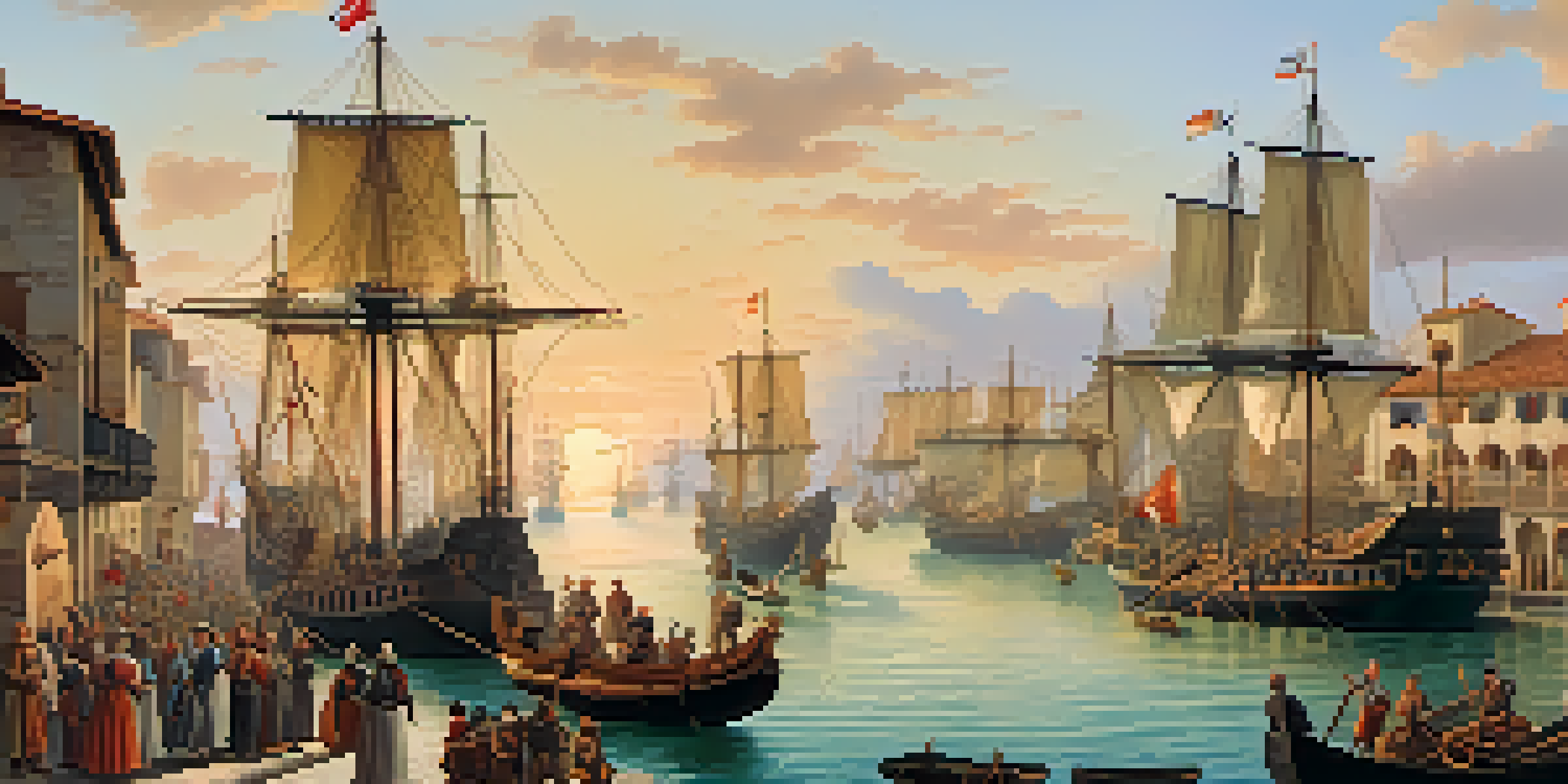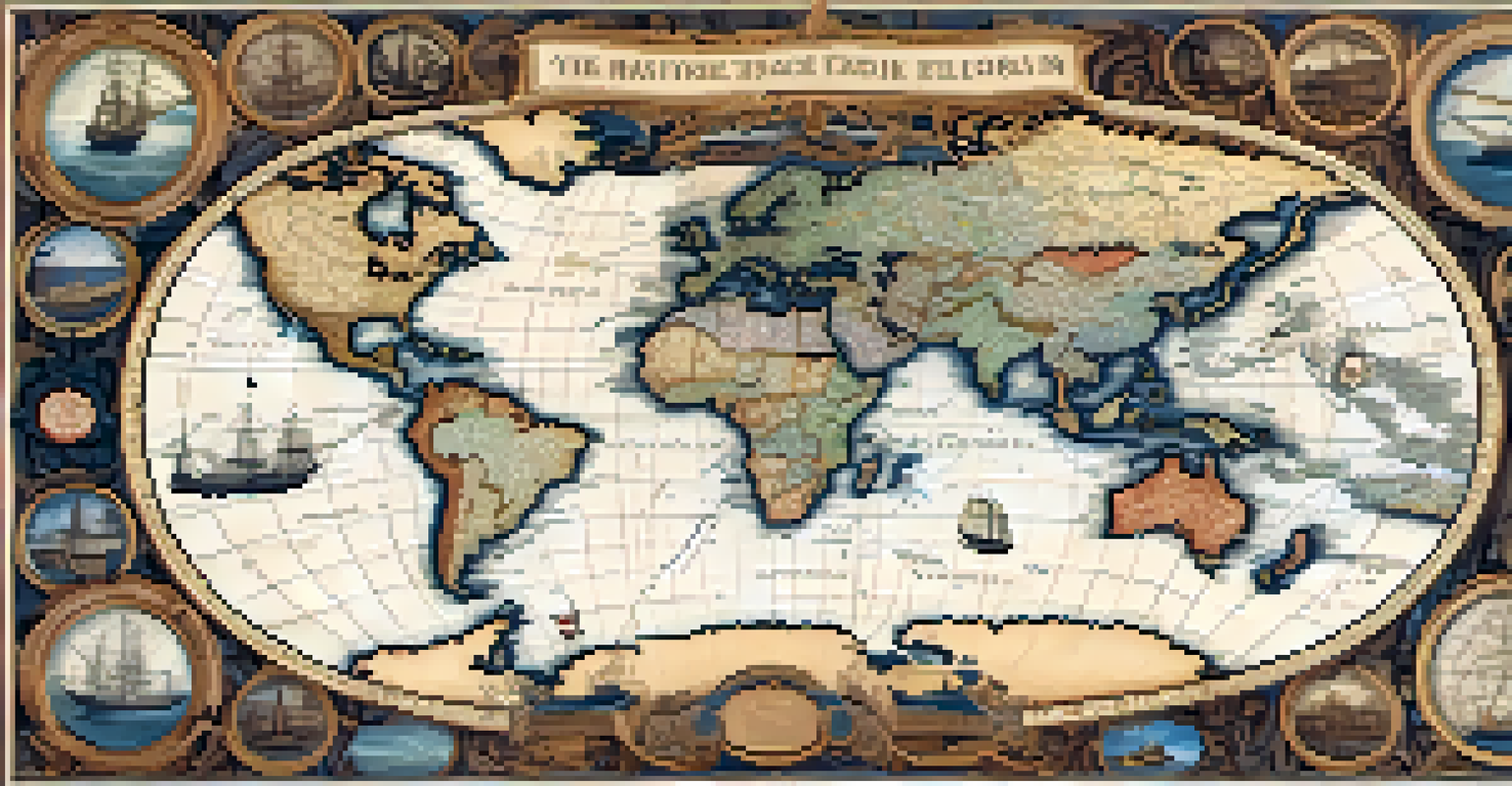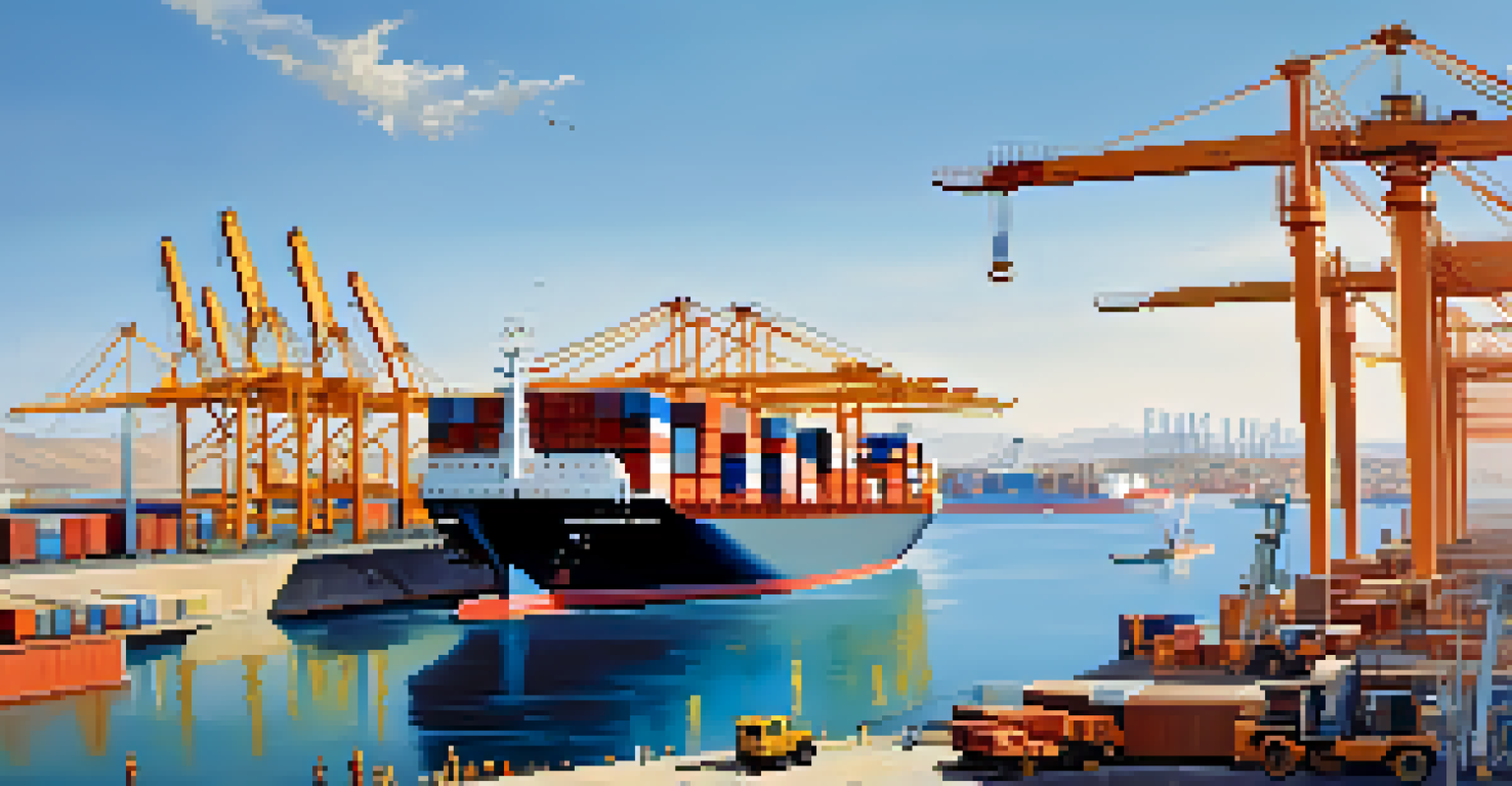The Role of Spain in Global Maritime Trade Through History

The Rise of Spain as a Maritime Power in the 15th Century
In the late 15th century, Spain emerged as a dominant maritime power, driven by a desire to explore new trade routes and territories. The unification of Spain under Ferdinand and Isabella spurred exploration, leading to the sponsorship of Christopher Columbus's voyage in 1492. This pivotal moment opened the doors to the Americas, allowing Spain to tap into vast resources and trade opportunities.
The sea, once it casts its spell, holds one in its net of wonder forever.
As Spanish fleets sailed across the Atlantic, they established crucial trade links between Europe and the New World, exchanging goods like silver, sugar, and tobacco. The influx of wealth transformed Spain into one of the most powerful nations of its time. The flourishing trade routes not only enriched Spain but also laid the groundwork for a global trading system that would evolve over the centuries.
However, this maritime expansion came at a cost, including the exploitation of indigenous populations and the establishment of colonies. While Spain's maritime prowess fostered economic growth, it also sparked conflicts and struggles for dominance with other European powers. This complex legacy continues to influence maritime trade dynamics today.
The Impact of Spanish Colonialism on Trade Networks
Spanish colonialism significantly reshaped global trade networks by connecting Europe, Africa, and the Americas. The establishment of colonies allowed Spain to control key trade routes and resources, turning cities like Seville and Cadiz into bustling trade hubs. These ports became crucial for the shipment of goods, including precious metals and agricultural products, back to Europe.

The Spanish galleons, which sailed between the Americas and Spain, were instrumental in transporting immense wealth, particularly silver from mines in Mexico and Peru. This influx of resources not only fueled Spain's economy but also had a profound impact on global markets. Countries around the world began to engage in trade with Spain, further intertwining their economies.
Spain's Maritime Dominance in Trade
In the 15th century, Spain became a leading maritime power, establishing crucial trade routes that connected Europe with the Americas.
Yet, this success was not without challenges. The competition from rival maritime powers like England, France, and the Netherlands intensified, leading to conflicts that would disrupt trade routes. The Spanish Empire's reliance on its colonies for trade ultimately made it vulnerable, illustrating the delicate balance of power in maritime trade.
Spain's Role in the Age of Exploration
The Age of Exploration marked a significant chapter in maritime history, with Spain playing a leading role in global exploration. Spanish explorers, such as Hernán Cortés and Francisco Pizarro, ventured into uncharted territories, claiming vast lands for the crown. Their expeditions not only expanded Spain's influence but also opened new avenues for trade and cultural exchange.
To be a sailor is to be a part of a great tradition; it is to experience the world in a way that few others do.
Spain's maritime dominance during this period was fueled by advances in navigation and shipbuilding. The introduction of the caravel, a nimble ship capable of sailing against the wind, revolutionized exploration efforts. These innovations allowed Spain to explore distant shores and establish trade routes that would connect Europe with Asia and the Americas.
However, the quest for new territories often led to the subjugation of indigenous peoples and the exploitation of their resources. This dark side of exploration raises important questions about the ethics of maritime expansion and its lasting impact on global trade relations. Understanding this history helps contextualize the complexities of modern maritime trade.
The Decline of Spanish Maritime Influence
By the 17th century, Spain's maritime supremacy began to wane, largely due to a combination of economic challenges and military conflicts. The costly wars, including the Eighty Years' War and conflicts with rival powers, drained Spain's resources, leading to a decline in naval strength. As a result, the once-mighty Spanish fleet struggled to maintain control over its vast trade networks.
The rise of other maritime nations, particularly England and the Netherlands, further eroded Spain's influence. These countries developed their own trade routes and colonies, competing fiercely for dominance in global trade. The shift in power dynamics marked a turning point in maritime history, as Spain found itself increasingly sidelined in the race for wealth and resources.
Cultural Exchange Through Trade
Spanish maritime trade facilitated significant cultural exchanges, blending local traditions and cuisines with influences from the Americas.
Despite this decline, Spain's historical contributions to maritime trade laid the groundwork for future developments. The lessons learned from Spain's rise and fall continue to resonate today, reminding us of the ever-changing nature of global trade and the importance of adaptability in a competitive landscape.
Spain's Modern Maritime Trade Landscape
Today, Spain remains an important player in global maritime trade, albeit in a different capacity than during its imperial heyday. With a strategic location along major shipping routes, Spanish ports such as Barcelona and Valencia serve as vital gateways for international trade. The country has embraced modern shipping practices, investing in infrastructure to accommodate larger vessels and facilitate efficient logistics.
Spain's maritime industry has diversified, focusing not only on traditional goods but also on emerging sectors like renewable energy and technology. The country's commitment to sustainability has positioned it as a leader in green shipping initiatives, reflecting a growing global trend toward eco-friendly practices. This evolution demonstrates Spain's ability to adapt to changing market demands.
While Spain's historical influence on maritime trade is undeniable, its current focus on innovation and sustainability underscores the importance of evolving with the times. By balancing its rich maritime legacy with contemporary practices, Spain continues to play a significant role in shaping the future of global trade.
Cultural Exchanges: A Result of Maritime Trade
Maritime trade has always been a catalyst for cultural exchange, and Spain’s history is a testament to this phenomenon. As Spanish ships navigated the oceans, they not only transported goods but also ideas, languages, and traditions. The interactions between Spanish traders and indigenous cultures led to a rich tapestry of influences that are still evident in modern Spanish society.
The mingling of cultures often resulted in the fusion of culinary practices, art, and music, creating unique hybrids that reflect Spain's diverse heritage. For instance, the introduction of new ingredients from the Americas, such as tomatoes and potatoes, transformed Spanish cuisine forever. This cultural blending illustrates how maritime trade can foster understanding and collaboration among different peoples.
Legacy of Spanish Maritime History
Spain's historical maritime trade practices continue to inform contemporary trade strategies and foster innovation in the shipping industry.
However, it’s important to acknowledge that these exchanges weren't always equitable. The imposition of Spanish culture on indigenous populations often led to the erasure of local traditions. Understanding this duality of cultural exchange helps us appreciate the complexities of maritime trade's impact on society.
The Legacy of Spain in Contemporary Maritime Trade
The legacy of Spain's maritime trade history continues to influence contemporary practices and policies. As global trade evolves, Spain's historical experience provides valuable insights into managing complex trade networks and navigating geopolitical challenges. The lessons learned from centuries of maritime activity inform current strategies for promoting trade and economic growth.
Moreover, Spain's commitment to maritime education and research fosters innovation in the shipping industry. Institutions dedicated to maritime studies equip future leaders with the knowledge and skills required to thrive in a competitive global market. This investment in education underscores the importance of adapting to new technologies and practices.

Finally, Spain's rich maritime heritage is celebrated through various cultural events and initiatives that honor its historical significance. By acknowledging its past, Spain not only cherishes its identity but also inspires future generations to engage with the maritime world. This legacy is a reminder of the enduring impact of maritime trade on both local and global scales.